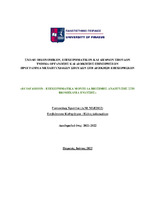Eco-fashion : επιχειρηματικά μοντέλα βιώσιμης ανάπτυξης στη βιομηχανία ένδυσης

Προβολή/
Λέξεις κλειδιά
Περιβαλλοντικό αποτύπωμα ; Ένδυση ; Μόδα ; Πράσινη εφοδιαστική αλυσίδα ; Πράσινο μάρκετινγκ ; Ευρωπαϊκή Πράσινη Συμφωνία ; Βιομηχανία ένδυσης ; Κοινωνική ευαισθησία ; Ρυπογόνες διεργασίες ; Επιχειρηματικά μοντέλα ; ΑειφορίαΠερίληψη
Κύριος στόχος της εργασίας είναι η παρουσίαση και μελέτη επιχειρηματικών μοντέλων βιώσιμης ανάπτυξης τα οποία μπορούν να συμβάλουν στην μείωση του περιβαλλοντικού αποτυπώματος της βιομηχανίας παραγωγής ενδυμάτων.
Αρχικά γίνεται ιστορική αναδρομή στον κλάδο της ένδυσης. Εκκίνηση αυτής της αναδρομής αποτελεί η Αίγυπτος και η Μεσοποταμία ενώ αυτή συνεχίζεται με την εποχή της Αναγέννησης, του Μπαρόκ, του Ροκοκό και του Νεοκλασικισμού και καταλήγει στον 20ο αιώνα και μια αναδρομή στον κλάδο του έτοιμου ενδύματος. Στο πλαίσιο αυτό γίνεται αναφορά περιγραφικά και στον όρο της μόδας και τα στάδια διαμόρφωσής αυτής η οποία αν και δεν έχει ακριβή ορισμό μέχρι σήμερα βρίσκεται σε άμεση σύνδεση με την ενδυμασία.
Στη συνέχεια, με κεντρικό άξονα μια προσπάθεια που έχει ήδη ξεκινήσει από παλαιότερα με το Πρωτόκολλο του Κιότο για την μείωση των προβλημάτων του περιβάλλοντος που αντιμετωπίζει η Γη μας κατά 50-70% και τις μεγάλες πιέσεις να εντείνονται με την Ευρωπαϊκή Πράσινη Συμφωνία προκειμένου να οδηγηθεί η Ευρώπη σε μια ουδέτερη κλιματικά ήπειρο έως το 2050 διαφαίνεται η αξία υιοθέτησης ενός βιώσιμου τρόπου ζωής. Βασικός αρωγός σε αυτήν την προσπάθεια είναι η οικοδόμηση μιας πράσινης εφοδιαστικής αλυσίδας η οποία θα μετασχηματίζει την εκάστοτε επιχείρηση σε βιώσιμη ενώ μέσω του πράσινου μάρκετινγκ αναδεικνύεται η σημασία του ανασχεδιασμού των παραγωγικών διαδικασιών τους για το περιβάλλον, τον πλανήτη και τον άνθρωπο με στόχο την ευαισθητοποίηση του καταναλωτή. Παράλληλα η περιβαλλοντική συνείδηση, η κοινωνική ευαισθησία, οι ηθικές αξίες και η αναβάθμιση της ποιότητας των προϊόντων μέσω του ανασχεδιασμού της εφοδιαστικής αλυσίδας των επιχειρήσεων συμβάλλουν στην ανάδειξη της εταιρικής τους κουλτούρας καθώς όλες οι δράσεις αυτές αποτυπώνονται στα πλαίσια της Εταιρικής Κοινωνικής Ευθύνης.
Επιπρόσθετα, γίνεται ανάλυση των εννοιών της πράσινης ένδυσης με έμφαση στην ελληνική αγορά και των οικολογικών σημάτων.
Καθώς παρουσιάζονται αναλυτικά οι ρυπογόνες διεργασίες της βιομηχανίας ένδυσης και κλωστοϋφαντουργίας προτείνονται τα μεθοδολογικά εργαλεία, επιχειρηματικά μοντέλα και οι τεχνικές προκειμένου να επιτευχθεί η αειφορία στον κλάδο. Κύριοι άξονες για τη βιώσιμη ανάπτυξη των βιομηχανιών ένδυσης είναι η βελτιστοποίηση χρήσης χημικών, η προσαρμογή της παραγωγικής διαδικασίας , η υιοθέτηση βέλτιστων διεργασιών (BATs) και ευφυών εργαλείων.
Ολοκληρώνοντας, θα παρουσιαστούν ορισμένες μελέτες περιπτώσεων (case studies) εταιρειών από την βιομηχανία ένδυσης που έχουν ενσωματώσει ήδη βιώσιμες πρακτικές σε διάφορες διεργασίες τους.


